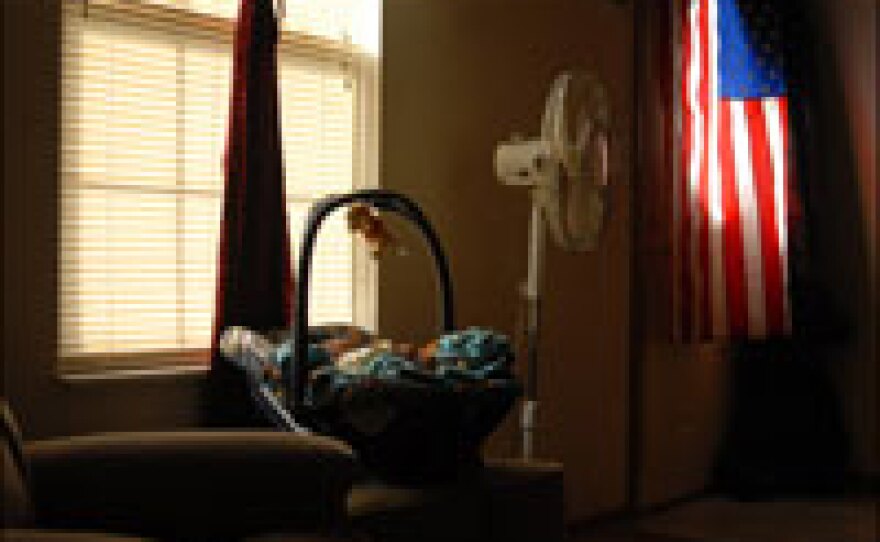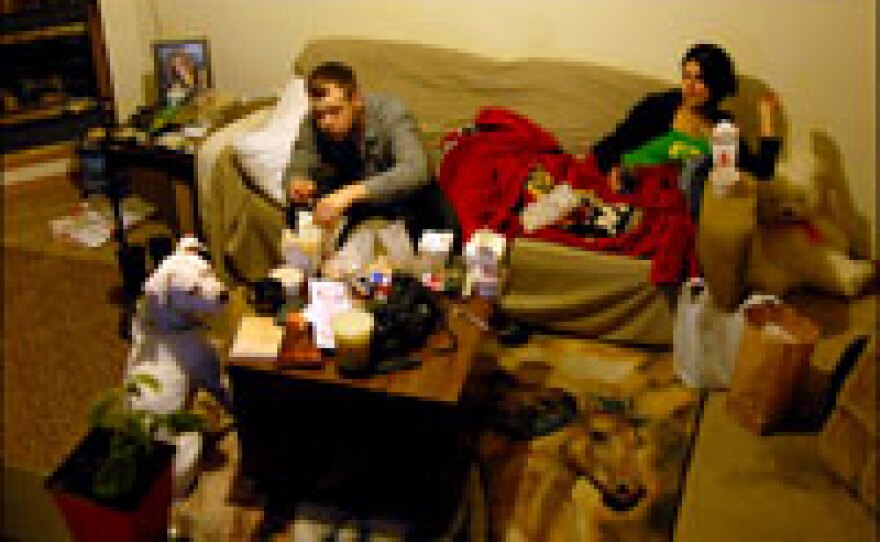


Munira Shahamorad was 20 years old and dressed head to toe in all-concealing black robes when she showed up at the gates of the U.S. Marine base in Fallujah, Iraq, looking for a job. She was desperate to escape her brother, who she says beat her and dragged her around by the hair.
"She came in with nothing, just the clothes on her back," said Sgt. Ivan Galvan, who worked closely with the Iraqi employees on the base. "One of the questions she was asking," Galvan recalled, "was what were we going to be able to provide for her safety."
The Americans gave the slender young woman from Fallujah a job as an interpreter and a room to live in. She earned $1,050 a month, more money than she had ever seen before. But she would never go home to see her family again. Signing on with the U.S. military could have meant a death sentence — probably in the form of an "honor killing" carried out by a male relative. To protect Shahamorad's identity, a U.S. officer gave her a nickname: Venus.
Shahamorad spent most of her salary on perfume, clothes and electronics sold at the base PX. She also started drinking alcohol, which was provided by other civilian contractors. It was on the base that Shahamorad first met the man who would one day become her husband, Sgt. Steve Campbell.
"First day I saw her, I told the guy that we were relieving, 'I'm in love, I'm gonna marry her,' " Campbell said. Soon, the Iraqi outcast and the American sergeant were having an illicit love affair on the base.
From Lovers To Husband-And-Wife
That was more then 3 years ago. After an unplanned pregnancy, Campbell's honorable discharge from the military and an arduous journey that left Shahamorad stranded in Turkey for nine months, the former Marine finally married his Iraqi Venus in Ozark, Mo.
"I couldn't afford rings when we got married, but my younger brother — he does tattoos. And he's cheap, so we got him some alcohol, and he got us permanent rings. She has one, too," Campbell said. The couple have each other's names, written in Arabic script, tattooed in ring form around their fingers.
Shahamorad's first lesson in America was to avoid telling people where she was from.
When Susan Avery learned that her neighbor was Iraqi, she admits she was frightened. "At first, it kind of scared me," Avery said. "But as far as Venus goes, she came here and straightened out a lot of thoughts that I had on the war, and a lot of thoughts that I had towards those people."
Campbell's father, Gerry, said, "People do act kind of weird when they find out she's from Iraq." He added, laughing, "She's gonna terrorize you, all right. Throw your dishes around the kitchen; cuss you in a different language."
Financial Hardships
One day at work, Campbell fell and badly broke his wrist. It cost him his job as a construction worker.
Unemployed and with his wife pregnant with their second baby, the Iraq veteran began pawning off personal belongings and even selling blood to make ends meet.
"[I] pawned off a lot of things, I've sold plasma several times," Campbell said. "You can make a lot of money if you just keep doing it — make decent money or enough to pay a bill, pay an electric bill or get some gas in the car."
"We had to have a long talk about like, America's not easy," Campbell said of his conversations with Shahamorad. "You have to pay for everything, nothing's free. Nothing is free, not even your freedom."
For Shahamorad, the financial hardships were a wake-up call.
"Have to really work hard," Shahamorad said. "Bills — he was talking about different bills every day, and I was like, 'What is that?' I ask a lot, 'What is this? What is this?' Because I don't know. What does car insurance mean? We don't have such a thing called car insurance. We don't have like electric bills. Stuff like that."
Searching For A Job
Shahamorad cradled and rhythmically patted her newborn son, Xander, on the back as she described going door to door in Ozark looking for a job. At one point, she was excited when the fast-food chain Wendy's offered to hire her.
"They gave me a uniform!" Shahamorad said. "[But then] they were like, 'You don't have a Social Security number? Green card?' And I'm like, 'No, I've only been here a few months.' They said, 'Sorry, we cannot let you work here.' "
Eventually, the young Iraqi mother found a bar where the manager didn't ask too many questions.
"The woman there, she said she don't need a waitress, she need a dancer," Shahamorad said. "I was like, 'Wow, dancer!' I used to do belly-dancing, you mean belly-dancing? I'll put my clothes on me, but she's like, 'No, it's different kind of dance.' "
It was a strip bar. That night, Shahamorad drummed up the courage to go on stage. She came home with $350 in her pocket.
The woman who couldn't even step outside her house in Fallujah without wearing a veil began pole-dancing — topless — under the strobe lights. None of the customers who buy her drinks and throw dollars onto the stage know that the performing Venus is Iraqi.
Troubles At Home
The work brought the young family much-needed money, but it strained what was already an often tempestuous relationship. The couple fought on almost a nightly basis.
"Hated it since day one, and still do," Campbell said.
For Shahamorad, pole-dancing was a question of survival.
"Every day, I think about not going back there, that I'm no doing it any more," she said. "But then what am I gonna do? Die hungry? Not have a place to stay? I might go back to Iraq if Brad [her first child] wasn't here."
One day, Campbell came home from his new job welding cars for $10 an hour and found his wife distressed and agitated, and his 1-year-old son, Bradley, covered with bruises.
"That's one thing I won't tolerate," Campbell said. That night, he called the police and watched as they took Shahamorad away in handcuffs.
Not An Isolated Case
In court, a prosecutor threatened Shahamorad with seven years in prison for child abuse and urged her to go back to Iraq. Bradley was placed in foster care, and Shahamorad was ordered into therapy and couples' counseling with Campbell, who was diagnosed with post-traumatic stress disorder, most likely compounded by his two tours of duty in Iraq.
"I think they're a product of war," said Bonnie Vawter, a children's services worker who handled their case.
"We have two people who met each other during war. They fell in love. They're trying to make a life with each other," Vawter said. "They have a lot of obstacles, just because of their circumstances and the cultural differences and citizenship and things like that. And I don't think this is an isolated case."
In September, after months of supervised visits, the Department of Family Services finally gave Shahamorad and Campbell full custody of their talkative, smiling son Bradley.
"Venus has just finally got it together," Vawter said in a telephone interview shortly afterward. "They're good parents; they just didn't have the resources and the tools."
This month, a judge at the circuit court in Christian County, Mo., handed Shahamorad a less severe sentence than the prosecutor initially asked for: five years' supervised probation. The suspended sentence does not include a felony conviction for child abuse.
"She entered a guilty plea, but the judge was not going to convict her," said Paul Duchscherer, Shahamorad's public defender. "It is a wonderful result, and she earned it with time and effort."
Hopes Dashed
With Shahamorad's fluency in Arabic and Kurdish, and her prior experience working with the Marines, the Campbells had pinned their hopes on finding potentially lucrative work for Shahamorad as an interpreter for the U.S. government or military. They were waiting for the authorities to approve her six-month old application for a work permit.
But last Tuesday, Campbell says he returned home to once again find Bradley covered with bruises.
The former Marine immediately accused his wife of abusing the child, accusations he says Shahamorad denied. Campbell kicked her out of the house, and says he took her cell phone before she left. That was the last time Campbell saw his wife.
Bradley was hospitalized that night.
Campbell was distraught as he spoke by telephone from the pediatric ward of St. John's Hospital in Springfield, Mo., on Wednesday night. He wondered aloud whether he had been too quick to jump to conclusions by accusing Shahamorad, and added that Bradley could have been injured tumbling from the top of his new bunk bed.
The Springfield Police Department has launched an investigation into the incident.
"Nobody has been charged or anything. I can't say whether or not it's going to be criminal," said a detective from the children's division. Neither the detective nor Campbell say they have any way of reaching Shahamorad. NPR could not reach Shahamorad this week for comment.
On Thursday night, officials from the Department of Family Services took custody of both children from Campbell.
Copyright 2022 NPR. To see more, visit https://www.npr.org. 9(MDAzMjM2NDYzMDEyMzc1Njk5NjAxNzY3OQ001))







